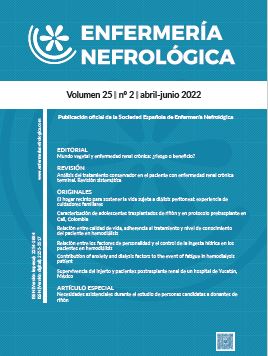Main Article Content
Abstract
Nutrition throughout kidney disease is linked to a large number of restrictions. Currently, nutritional recommendations for patients with kidney disease are changing, presenting elements in common with the general population. It is recommended to reduce the consumption of ultra-processed foods, as they are enriched in salt, fats and additives, many of which are phosphorus and potassium additives; these additives have a bioavailability of 100%, compared to dietary phosphorus and potassium found in foods of natural origin, with an absorption of between 50-80%, depending on the type of food.
Dietary potassium management is one of the major problems in the renal population. It is now being shown that increased blood potassium levels have more causative agents than just dietary potassium intake, such as prolonged fasting, constipation, poor metabolic control of glucose and the use of certain drugs, among other factors.
These data show that before resorting to dietary restriction of dietary potassium sources, new approaches should be considered.
Keywords
Article Details
Copyright (c) 2022 Almudena Pérez Torres

This work is licensed under a Creative Commons Attribution-NonCommercial 4.0 International License.
Author copyright notice
© Authors grant the publisher the non-exclusive licence to publish the work and consent to its use and distribution under the Creative Commons Attribution - NonCommercial 4.0 International (CC BY-NC 4.0) licence. Read the licensing information and the legal text here. This must be expressly stated wherever necessary.
References
- Ko GJ, Obi Y, Tortorici AR, Kalantar-Zadeh K. Dietary protein intake and chronic kidney disease. Curr Opin Clin Nutr Metab Care. 2017;20(1):77-85. https://doi.org/10.1097/MCO.0000000000000342. DOI: https://doi.org/10.1097/MCO.0000000000000342
- Ikizler TA, Cano NJ, Franch H, Fouque D, Himmelfarb J, Kalantar-Zadeh K, et al. International Society of Renal Nutrition and Metabolism. Prevention and treatment of protein energy wasting in chronic kidney disease patients: a consensus statement by the International Society of Renal Nutrition and Metabolism. Kidney Int. 2013;84(6):1096-107. https://doi.org/10.1038/ki.2013.147. DOI: https://doi.org/10.1038/ki.2013.147
- Ikizler TA, Cuppari L. The 2020 Updated KDOQI Clinical Practice Guidelines for Nutrition in Chronic Kidney Disease. Blood Purif. 2021;50(4-5):667-71. https://doi.org/10.1159/000513698. DOI: https://doi.org/10.1159/000513698
- Aranceta-Bartrina J, Partearroyo T, López-Sobaler AM, Ortega RM, Varela-Moreiras G, Serra-Majem L, et al. Updating the Food-Based Dietary Guidelines for the Spanish Population: The Spanish Society of Community Nutrition (SENC) Proposal. Nutrients. 2019;11(11):2675. https://doi.org/10.3390/nu11112675. DOI: https://doi.org/10.3390/nu11112675
- Carrero JJ, González-Ortiz A, Avesani CM, Bakker SJL, Bellizzi V, Chauveau P, et al. Plant-based diets to manage the risks and complications of chronic kidney disease. Nat Rev Nephrol. 2020;16(9):525-42. https://doi.org/10.1038/s41581-020-0297-2. DOI: https://doi.org/10.1038/s41581-020-0297-2
- Clegg DJ, Headley SA, Germain MJ. Impact of Dietary Potassium Restrictions in CKD on Clinical Outcomes: Benefits of a Plant-Based Diet. Kidney Med. 2020;2(4):476-87. https://doi.org/10.1016/j.xkme.2020.04.007. DOI: https://doi.org/10.1016/j.xkme.2020.04.007
- Yamada S, Inaba M. Potassium Metabolism and Management in Patients with CKD. Nutrients. 2021;13(6):1751. https://doi.org/10.3390/nu13061751. DOI: https://doi.org/10.3390/nu13061751
References
Ko GJ, Obi Y, Tortorici AR, Kalantar-Zadeh K. Dietary protein intake and chronic kidney disease. Curr Opin Clin Nutr Metab Care. 2017;20(1):77-85. https://doi.org/10.1097/MCO.0000000000000342. DOI: https://doi.org/10.1097/MCO.0000000000000342
Ikizler TA, Cano NJ, Franch H, Fouque D, Himmelfarb J, Kalantar-Zadeh K, et al. International Society of Renal Nutrition and Metabolism. Prevention and treatment of protein energy wasting in chronic kidney disease patients: a consensus statement by the International Society of Renal Nutrition and Metabolism. Kidney Int. 2013;84(6):1096-107. https://doi.org/10.1038/ki.2013.147. DOI: https://doi.org/10.1038/ki.2013.147
Ikizler TA, Cuppari L. The 2020 Updated KDOQI Clinical Practice Guidelines for Nutrition in Chronic Kidney Disease. Blood Purif. 2021;50(4-5):667-71. https://doi.org/10.1159/000513698. DOI: https://doi.org/10.1159/000513698
Aranceta-Bartrina J, Partearroyo T, López-Sobaler AM, Ortega RM, Varela-Moreiras G, Serra-Majem L, et al. Updating the Food-Based Dietary Guidelines for the Spanish Population: The Spanish Society of Community Nutrition (SENC) Proposal. Nutrients. 2019;11(11):2675. https://doi.org/10.3390/nu11112675. DOI: https://doi.org/10.3390/nu11112675
Carrero JJ, González-Ortiz A, Avesani CM, Bakker SJL, Bellizzi V, Chauveau P, et al. Plant-based diets to manage the risks and complications of chronic kidney disease. Nat Rev Nephrol. 2020;16(9):525-42. https://doi.org/10.1038/s41581-020-0297-2. DOI: https://doi.org/10.1038/s41581-020-0297-2
Clegg DJ, Headley SA, Germain MJ. Impact of Dietary Potassium Restrictions in CKD on Clinical Outcomes: Benefits of a Plant-Based Diet. Kidney Med. 2020;2(4):476-87. https://doi.org/10.1016/j.xkme.2020.04.007. DOI: https://doi.org/10.1016/j.xkme.2020.04.007
Yamada S, Inaba M. Potassium Metabolism and Management in Patients with CKD. Nutrients. 2021;13(6):1751. https://doi.org/10.3390/nu13061751. DOI: https://doi.org/10.3390/nu13061751




